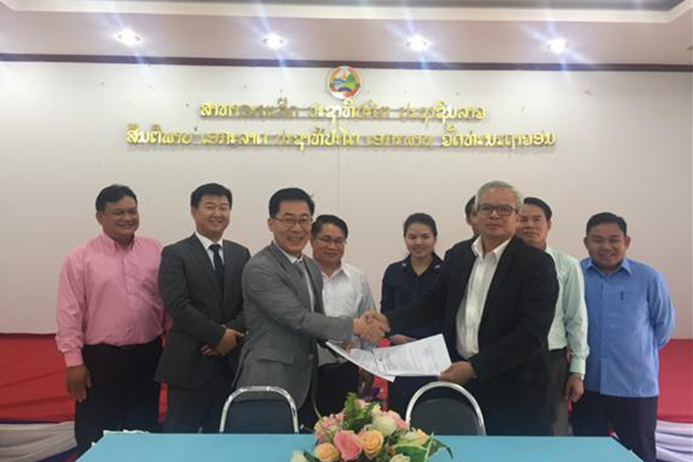CIAP Briefing

Dr. Wonkyu Cha is the newly appointed Research fellow of the Center for International Agricultural Partnership in the Department of Global Cooperation Research at Korea Rural Economic Institute in 2018. He holds a doctorate in Agricultural Economics from the Oklahoma State University focused on Environmental and Resource Economics. He conducted research in the areas of environmental and resource economics focusing on valuing water and water-based amenities, adaptation to climate change, and estimating market demand for food and agricultural products. Based on his extensive research experience on economic valuation methods and adaptation to climate change, his research interest in CIAP links to impact evaluation of ODA project and sustainable international development cooperation programs responding to climate change in developing countries. He is inquisitive, enthusiastic and self-motivated individual. CIAP is expecting he would be a great asset to the KREI and the field of international cooperation research.
KREI Held 2018 Agricultural Outlook Conference
“Agricultural Production Value to Increase by 0.8%, Farm Household Income by 2.4% Year on Year”

Seoul, Jan. 24, 2018 – The Korea Rural Economic Institute (KREI) held the 2018 Agricultural Outlook Conference on “The Future of Agriculture and Rural Areas with the People” at the Crystal Ballroom on the third floor of the Lotte Hotel (Jamsil-dong, Songpa-gu, Seoul), Jan. 24.
This year marks the 21st anniversary of the Agricultural Outlook Conference. The conference, launched with about 100 attendees in 1998, grew into the largest event in the agriculture sector, with approximately 1,700 participants this year.
The 2018 conference aimed to focus on strengthening public interest functions of agriculture and contributing to enabling the consumption of safe agricultural products. To this end, with the main theme, “The Future of Agriculture and Rural Areas with the People,” detailed presentation topics were selected in response to the changes in conditions.
Among the contents of this year’s agricultural outlook, several changes need attention. Despite economic uncertainty at home and abroad, the agricultural production value is forecasted to grow by about 0.8% compared to the previous year. Also, in spite of increasing management costs and the aging population, farm household income will rise by 2.5% to over KRW 40 million.
Due to the implementation of the government’s Rice Production Control Program, the rice oversupply structure is expected to improve gradually. If the government’s animal welfare plan to manage layer chicken rearing density is implemented, the number of layer chickens will decrease by approximately 1.12 million in 2018, and egg prices are forecasted to increase by 5.2%.
The farm household income per household will grow by 2.4% year on year to KRW 39.69 million. However, agricultural income is expected to decline, and its proportion in farm household income is forecasted to decrease by 3.1%p compared with last year to 25.5%, showing a continued downtrend. Accordingly, non-farm income in farm household income is expected to become an important income source gradually.
In terms of consumption, the consumption of rice and kimchi will decline, while the consumption of meat and imported tropical fruit is forecasted to grow due to the westernized diet.
KREI Signed ROD for KAPEX Program: Korean Agricultural Policy Experiences Shared with Cambodia, Laos, Mongolia

Phnom Penh, Vientiane and Ulaanbaatar, February, 2017 – The Korea Rural Economic Institute’s Center for International Agricultural Partnership (CIAP) visited the Cambodian Ministry of Agriculture, Forestry and Fisheries, the Ministry of Agriculture and Forestry of Laos, and Mongolia’s Khalkhgol Project Group on Feb. 6, 12, and 21 respectively, and signed records of discussion (ROD) for implementing the KAPEX (Korean Agricultural Policy Experiences for Food Security) program.
For the 2018 KAPEX program, the CIAP received project request forms from the three countries, and conducted prior feasibility studies in 2017 based on the requests. Based on the project requests and prior feasibility studies, the following project themes were selected: “Increasing Farm Household Income by Creating Vegetable Complexes” for Cambodia; “Strengthening Market Accessibility by Improving Policies for Agricultural Cooperatives” for Laos; and “Agricultural Capacity Building Through the Improvement of the Livestock Sector’s Value Chain System” for Mongolia.
These projects are expected to contribute to solving the food security issue and strengthening related policy capacities by sharing Korean agricultural policy experiences related to the theme of each country with Cambodia, Laos, and Mongolia. KREI’s CIAP will carry out a theme-related joint survey with each partner country and training programs and workshops in Korea and the partner nations. Also, a visiting program and the KAPEX Academy (a global talent training program) will be operated for hands-on workers and high-level people in charge at relevant institutions in each partner country.

